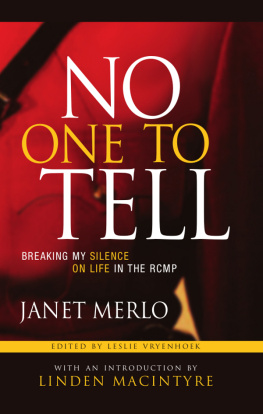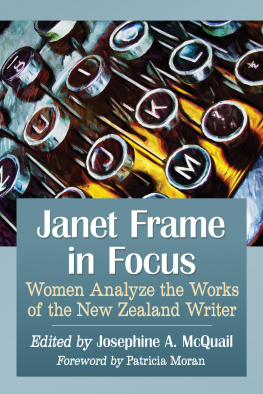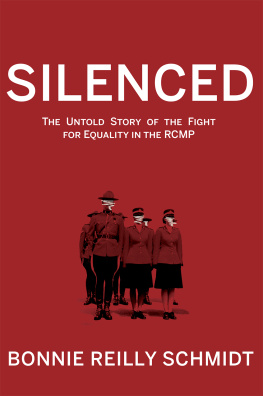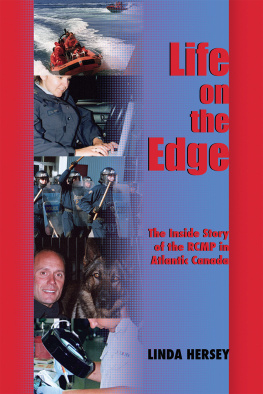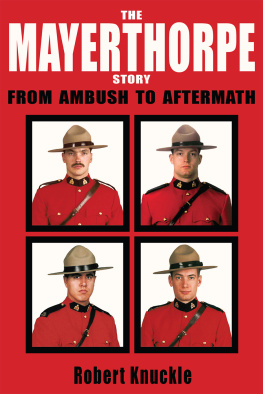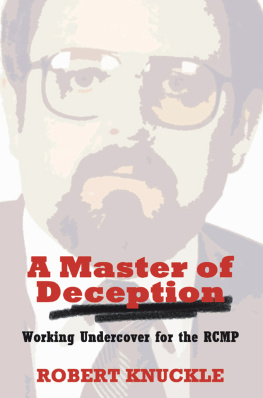
NO ONE TO TELL
JANET MERLO
NO
ONE TO
TELL

BREAKING MY SILENCE ON LIFE IN THE RCMP
BREAKWATER

1 Stamps Lane, St. Johns, NL, Canada, A1E 3C9
WWW.BREAKWATERBOOKS.COM
COPYRIGHT 2013 Janet Merlo
ISBN 978-1-55081-434-7
A CIP catalogue record for this book is available from Library and Archives Canada.
All Rights Reserved. No part of this publication may be reproduced, stored in a
retrieval system or transmitted, in any form or by any means, without the
prior written consent of the publisher or a licence from The Canadian Copyright
Licensing Agency (Access Copyright). For an Access Copyright licence,
visit www.accesscopyright.ca or call toll free to 1-800-893-5777.

We acknowledge the support of the Canada Council for the Arts, which last year
invested $154 million to bring the arts to Canadians throughout the country.
We acknowledge the Government of Canada through the Canada Book Fund
and the Government of Newfoundland and Labrador through the Department of
Tourism, Culture and Recreation for our publishing activities.
PRINTED AND BOUND IN CANADA.

I WOULD LIKE TO DEDICATE this book to the serving members of the RCMP who keep our communities safe. To my friends, who were my anchors through some of the worst years of my life. To my parents, who have stood by me throughout with unwavering support. To my exhusband, who has also suffered so much through all of this. And to my former colleagues, brave women, who have also told their stories in the hope of creating worth while change.
Most of all, I want to dedicate this book to my beautiful daughters Ashley and Erin. I am so blessed to have you. You have been my reason for fighting, my reason for living, and my reason for working to get my life back on track. You are both amazing, beautiful young ladies. This is for you.

CONTENTS
INTRODUCTION by Linden MacIntyre
EXITING AND BEGINNING
THE LETTER FROM THE RCMP on Christmas Eve 1990 telling Janet Merlo shed been accepted for membership caused a storm of conflicting feelings. She was thrilledshed known for a while she wanted to be a police officer. Now the door to a stable, rewarding future was swinging open. But she was suddenly full of selfdoubt. Am I ready? What if I lack the mental and physical qualities, the integrity and confidence and dedication to meet the standards of the legendary police force? Am I good enough to be a Mountie?
The last thing on Janet Merlos mind as she struggled with the sudden, now daunting, challenge was the peril of harassment and disrespect. Police officers are empowered to protect the vulnerable from bullies. Along with the right to wear the garb of law enforcement, they automatically become entitled to respect. How could she have anticipated that in such an institution as the RCMP she would find, among her colleagues, manyone in ten she reckonswho would be bullies? How could she have anticipated disrespect, vulgarity, emotional and often physical harassment in a workplace dedicated to the ideals of justice?
Eight months later, August 26, 1991, she was one of twentynine freshfaced Mounties proudly marching through a graduation ceremony at the RCMP training depot in Regina, Saskatchewan, sworn and trained and irreversibly committed to uphold the right. One of her troop mates was Catherine Galliforda friend who, in the distant future, would become an ally. Like Merlo, Galliford would become another highprofile casualty in the quiet, grinding struggle by women to find viable careers within a culture traditionally defined by men to value exclusive, often primitive, notions of manhood.
No One to Tell is a sad account of history and human nature, a story of idealism dying slowly, and of the anger and the cynicism that fill the gaps left behind by lost ideals, eventually infecting every aspect of an individuals existence. It is the story of many women in many walks of life, not just the Mounties, but it is of particular importance considering the deference and power that we concede to people we deem to be exceptionalteachers, legislators, clergy, and police, to name just a few.
It is also, as such stories often are, about institutional betrayal and the systemic failure of leadershipan all too human tendency in leaders to avoid confronting realities that, acknowledged, could undermine institutional authority. It is a syndrome that threatens the integrity of all institutions, the impulse to sacrifice a principled individual grievance to protect an institutional faade, an impulse with the frequent and paradoxical result that institutions are, themselves, thus corrupted and reduced.
The institution Janet Merlo went to work for in 1991 was a troubled place. The modern RCMP started out in 1873 as the Royal North West Mounted Police, a paramilitary organization that would grow to be the principal source of law and order in three territories and eight provinces. It would take 101 years to accept the possibility that women had a role in law enforcement. There was widespread scepticism when the change came, in May 1974. There were jokes (I personally heard the references by Mountie acquaintances to Dickless Tracy and new avenues for undercover work). There were dark predictions of sexual tensions and inevitable trysts when men and women were assigned to work togetherunsupervised, in cars, at nightand a sharp escalation in conflict in the domestic lives of married (male) Mounties. The underlying fear seemed to be that women are inherently unstable emotionally and sexually and would disturb the natural decorum and collegiality of the work place. In many cases, thats exactly what happened, but not because of inherent instability among the new female officers; it was instead because their arrival exposed a shocking immaturity and chauvinism among many of their male colleagues. One could speculate how such flaws in character affected how these officers interacted with members of the public. It is for now sufficient only to review how these basic human failings affected the work and the lives of the new female recruitsand the wider public perception of the RCMP as an institution.
Janet Merlo wasnt working long in her first job at the detachment in Nanaimo, BC, when she began hearing isolated references to alleged harassment of women officers who were inevitably bitches to be shunned and, when opportunities arose, to be punished for their distracting petty grievances. She understood instinctively the code by which conformity and collegiality are vital to the bonding that creates a comfort zone when times get tough. Knowing that a colleague has your back is essential to the confident performance of duties that are often dangerous. Even when her own legitimate complaint (about manpower shortages) was dismissed by a superior with the comment Boys, Merlo is on the rag again an instinct for selfpreservation shut her down.
Next page
